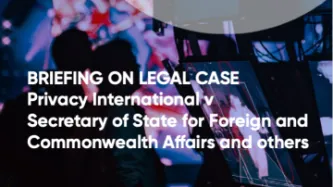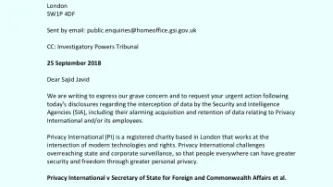Advanced Search
Content Type: Advocacy
We responded to the Home Office consultation on codes of practices under the Investigatory Powers (Amendment) Act 2024 (IPAA). Our response focused on (1) the draft codes relating to bulk personal datasets with low or no reasonable expection of privacy, (2) third-party bulk personal datasets and (3) the notices regime. You can download our full response with its 23 recommendations for reform at the bottom of this page.'Low Privacy' Bulk Personal DatasetsThe IPAA introduces a new concept of…
Content Type: Long Read
Additionally, in January 2020 Privacy International and UK-based NGO Liberty filed a new claim against MI5 and the Secretary of State for the Home Department in the Investigatory Powers Tribunal (the “Ungoverned Spaces Case”, this time, the case sought to hold MI5 and the SSHD accountable for systemic, long-term failures in the way they handle and retain millions of people’s personal data. As part of this claim, PI requested that the IPT re-opens parts of the original BPD/BCD. This aspect of…
Content Type: News & Analysis
What happened
On 22 July 2021, the Investigatory Powers Tribunal (IPT) issued a declaration on our challenge to the UK bulk communications regime finding that section 94 of the Telecommunications Act 1984 (since repealed by the Investigatory Powers Act 2016) was incompatible with EU law human rights standards. The result of the judgment is that a decade’s worth of secret data capture has been held to be unlawful. The unlawfulness would have remained a secret but for PI’s work.
You…
Content Type: Press release
A joint press release from Privacy International, Reprieve, CAJ, and the Pat Finucane Centre.
Agents of MI5 and other Government bodies could be legally authorised to commit crimes under new legislation introduced today. There appear to be no express limits in the legislation on the types of crime which could be authorised.
The Covert Human Intelligence Sources (Criminal Conduct) Bill appears not to explicitly prohibit the authorisation of murder, torture, or sexual violence. Reprieve,…
Content Type: Press release
MI6 has been forced to apologise to the Investigatory Powers Tribunal after two of its officers asked court staff to return documents relating to MI6’s use of agents and not show them to judges. The Tribunal suggested MI6’s actions were “inappropriate interference”.
The revelation emerged in an ongoing legal case considering what crimes intelligence informants are allowed to commit, after it was revealed that MI5 maintains a secret policy under which agents can be “authorised” to…
Content Type: News & Analysis
*Photo by Michelle Ding on Unsplash
Pat Finucane was killed in Belfast in 1989. As he and his family ate Sunday dinner, loyalist paramilitaries broke in and shot Pat, a high profile solicitor, in front of his wife and children.
The Report of the Patrick Finucane Review in 2012 expressed “significant doubt as to whether Patrick Finucane would have been murdered by the UDA [Ulster Defence Association] had it not been for the different strands of involvement by the…
Content Type: Long Read
*Photo by Kristina Flour on Unsplash
The British government needs to provide assurances that MI5’s secret policy does not authorise people to commit serious human rights violations or cover up of such crimes
Privacy International, along Reprieve, the Committee on the Administration of Justice, and the Pat Finucane Centre, is challenging the secret policy of MI5 to authorise or enable its so called “agents” (not MI5 officials) to commit crimes here in the UK.
So far we have discovered…
Content Type: News & Analysis
The Watson/Tele2 decision of the CJEU concerned section 1 and 2 of DRIPA and the Data Retention Regulations 2014. This contained the legislative scheme concerning the power of the Secretary of State to require communications service providers to retain communications data. Part 3 of the Counter-Terrorism and Security Act 2015 amended DRIPA so that an additional category of data - that necessary to resolve Internet Protocol addresses - could be included in a requirement to retain…
Content Type: Advocacy
RESPONSE OF PRIVACY INTERNATIONAL TO THE CONSULTATION ON THE GOVERNMENT’S PROPOSED RESPONSE TO THE RULING OF THE COURT OF JUSTICE OF THE EUROPEAN UNION ON 21 DECEMBER 2016 REGARDING THE RETENTION OF COMMUNICATIONS DATA
[Full response below]
Introduction
The consultation is in response to the judgment in Tele2 Sverige AB v Post-och telestyrelsen (Case-203/15) and R (Watson) v Secretary of State for the Home Department (Case C-698/15) [“Watson judgment”].
The case concerned…
Content Type: Explainer
In 2000, the Government told Parliament that the Regulation of Investigatory Powers Act 2000 (RIPA) was the total extent of surveillance powers that were needed. However, within weeks of RIPA receiving Royal Assent, a report from UK law enforcement was leaked, stating that the power the Government truly wanted was companies to retain communications data on all their users.
Immediately after 9/11 as governments around the world over-reached with new pieces of…
Content Type: Long Read
The UK's domestic-facing intelligence agency, MI5, today admitted that it captured and read Privacy International's private data as part of its Bulk Communications Data (BCD) and Bulk Personal Datasets (BPD) programmes, which hoover up massive amounts of the public's data. In further startling legal disclosures, all three of the UK's primary intelligence agencies - GCHQ, MI5, and MI6 - also admitted that they unlawfully gathered data about Privacy International or its staff. You can read the…
Content Type: Press release
Thames House, Offices of MI5. Photo Credit: Wikimedia Commons
MI5 collected Privacy International’s private data and examined it
GCHQ, MI5, and MI6 unlawfully collected data relating to UK charity Privacy International
Privacy International has written to the UK's Home Secretary demanding action against spy agencies
Disclosures come less than a fortnight after UK laws on mass surveillance ruled unlawful at European Court of Human Rights
The UK's domestic-facing intelligence…
Content Type: Press release
We found this image here
The Investigatory Powers Tribunal (IPT) today held that, for a sustained period, successive Foreign Secretaries wrongly gave GCHQ unfettered discretion to collect vast quantities of personal customer information from telecommunications companies.
The judgment exposes:
· the error-ridden and inconsistent evidence provided by GCHQ throughout the case;
· the willingness of telecommunications companies to secretly hand over customer data on the basis of mere verbal…
Content Type: Press release
Hearing: Cross examination of senior GCHQ official about Intelligence Agencies’ use of massive databases of information about everyone in the UK
When: Monday 26 February 2018, 3.15pm
Where: Royal Courts of Justice, Court 28, Strand, London WC2A 2LL
Summary
This is the first time GCHQ have given open evidence in the Investigatory Powers Tribunal (The Tribunal). It is also the first time they will be cross examined by Privacy International on serious misleading errors they provided in…
Content Type: Press release
The Case
Privacy International v Secretary of State for Foreign and Commonwealth Affairs et al. (Bulk Personal Datasets & Bulk Communications Data challenge)
Date: 5-9 June 2017
Time: from 10:00 onwards
Location: Royal Courts of Justice, The Strand, London WC2A 2LL United Kingdom
Hearing overview
Next week’s hearing follows the Investigatory Powers Tribunal’s earlier judgment in October 2016, which ruled that three issues are to be determined:
…












